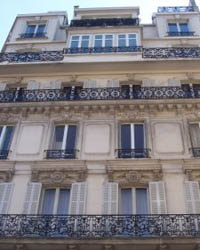There are many stories floating around about expats who move to Paris, search high and low for an apartment and then get caught in tons of paperwork. There’s also the matter of less than honest landlords who can make finding your dream apartment a distant dream. Although the home rental market in Paris is a difficult place, especially for expats, there are some things you can do to simplify the process.
Most of the population in Paris lives in apartments, which are available in a variety of price categories. Location plays a key role, and depending on the locality, you may have to pay a few hundred euros or a few thousand. Other important criteria are size of the apartment and amenities. It’s a good idea to be certain of your requirements before you move to the city. Houses are much too expensive to buy or rent.Other than the rental apartments, there are also serviced apartments available, which provide all basic amenities along with a fully equipped kitchen. If you want to stick with rental apartments and have a slightly larger budget, opt for a fully furnished apartment. This way you won’t have to go through the trouble of shipping your things or buying everything from scratch in Paris. A point to make note of here is that the leases of furnished and unfurnished apartments are treated differently.
Unfurnished & furnished apartments
If an unfurnished apartment is your choice, you will need to sign a standard rental contract for a period of three years.
This works in your favor as it prevents your landlord from vacating you as and when he chooses. Even if he wants you to leave at the end of the full lease term, he must hand you a letter six months before the lease expires. If he fails to do this, the lease is automatically renewed for three more years.
If you wish to leave before the due date, you can give a three months notice. If you can’t wait that long in case of a job transfer, a letter from your employer will enable you to give just a month’s notice.
For furnished apartments, the legal minimum period is one year. You can leave before a year by giving a notice of one month. The lease for a furnished apartment is automatically renewed at the end of a year.
Estate agents
Real estate agencies in Paris have to be certified by the Prefecture of Police. Opt only for those agents with a professional identification number, guarantor and insurance. It is mandatory for all these to be stated on contracts. You will have to pay a fee for an agency’s services in order to secure an apartment. Real estate agents may display variation in prices of listed properties, so it’s a good idea to look around before you settle on one.
Other than real estate agents, you can also look through advertisements in local newspapers, publications and websites such as Leboncoin, Fusac and Craigslist. If the owner has placed an ad, you can completely bypass an agency and save up some money.
The lease
The lease (droit de bail or contrat de location), which will be signed by you and the landlord, has to be written in French and drafted by a notary according to law. You are also required to sign a document specifying the condition of the apartment.
Some landlords insist on seeing detailed financial records or a job contract to be certain that you are able to pay the rent.
Usually, tenants are requested to submit proof that they earn at least three times the monthly rent. Tenant’s insurance is also a legal requirement, the proof of which must be submitted to the landlord. Your monthly rent will include building maintenance and water charges, and sometimes parking. Air conditioning is usually not needed in Paris and residential buildings are also not allowed to have central or window units.
Tenants are also required to pay an annual habitation tax (taxe d’habitation). The amount can be found out at the local town hall. Other rental costs may include phone, cable and Internet services. If parking is not provided, you can opt for space in one of the underground parking garages, which offer monthly passes.

